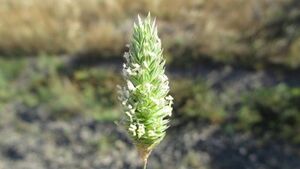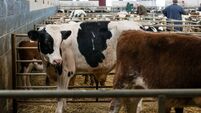Farming: Focus on combatting weed growth

A canary grass seed head.
It may not be immediately obvious, but now is an ideal time to start addressing the problem of weeds on the farm.
Cultivating problem areas immediately after harvest will encourage growth of seeds present so they can be destroyed ahead of sowing.
Once a weed problem, particularly involving grass weeds, such as Italian ryegrass, black grass and canary grass, becomes established on a farm, a detailed plan must be developed with your registered agronomist to guide a way out.
This may involve alternative cropping, along with integrated pest management (IPM) measures and the use of some of the available chemistry.
A proactive approach to preventing these weeds entering or becoming established on your farm is by far the best protection.
Key to this is the use of certified seed at sowing.
Irish certified seed has a zero tolerance to these grass weeds, along with wild oats and sterile brome. This is contrary to imported seed, which has higher tolerance levels of certain weed seeds.
It is vital also to follow other preventative measures to protect our crops.
It is widely acknowledged that combines and balers are the biggest spreaders when moving from farm to farm and even field to field.
Machine hygiene can have massive bearing on spread of grass weeds, such as canary or black grass, which have tiny seeds with extremely high numbers per head.
Farmers and industry must be conscious of having processes in place to properly clean down machinery, and where contractors are in use it is vital they have the same processes in place, but also are made aware of problem areas and equally make a farmer aware around cleaning ahead of arrival.
Certified seed growers, under their growing protocols agreed with the Department of Agriculture, Food and the Marine, must adhere to previous cropping and isolation requirements and as no weeds are tolerated in seed fields they must make a significant time commitment to rogueing weeds. The crop undergoes a series of inspections during growing and at harvest ahead of certification.
Seed growers cannot compromise when it comes to cleaning machinery, during all stages of cultivation, fertilising, spraying and harvesting.
These practices are becoming ever more important on other farms also, as value added crop options such as malting barley and gluten free oats require the highest purity levels.
Other biosecurity measures are becoming just as important for tillage farmers, especially considering there is now confirmed resistance in Italian ryegrass and blackgrass to some of the available chemistry.
This involves monitoring any inputs brought onto farm, such as knowing the source and possible content of farm yard manure.
Protecting a farm involves prevention, timely positive identification of a problem and immediate steps to plan on the best way of addressing the particular weed.
It is a unified approach from farmers all across the country that is necessary to protect our industry from the potential impacts on yield, input costs and cropping plans from the threat of grass weeds.
The Irish Seed Trade Association represents licensed multipliers of certified seed. The association promotes the use of certified seed and advocates for further development of the tillage sector through its contribution to policy and investment in plant breeding and research.
As a further measure ISTA members have committed to another Higher Voluntary Standard with regard to the assembling and certification or importing of straights and mixes for cover crops, wild bird measures and arable margins.
This Irish Seed Trade initiative is a HVS (Higher Voluntary Standard) to play our part in the control of grass weeds.
The vast majority of seeds (straights) for cover crops, wild bird measures and other arable margins are imported. Where possible ISTA members will use Irish Certified Seed.
ISTA members assembling or importing cover crop mixes or straights will have tested each lot. This is an internationally recognised 'Orange Certificate' for presentation to the Department of Agriculture officials ahead of sale or certification in the Republic of Ireland.
The official search will include blackgrass, wild oats and sterile brome.
Only ingredient lots with zero blackgrass test results assembled / imported by ISTA members will be used in mixtures for sale to Irish farmers.
Farmers and amenity users of these mixes should be aware of the availability of this Higher Voluntary Standard seed and check the label of any products they are considering purchasing, that it has undergone testing for the above grass weeds.






